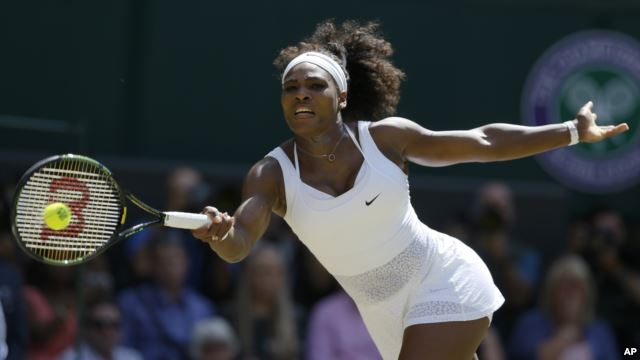VOA慢速英语:女网“黑珍珠”塞雷娜·威廉姆斯健康问题备受关注
 |
| Serena Williams of the United States returns a shot to Garbine Muguruza of Spain, during the women's singles final at Wimbledon, London, Saturday July 11, 2015. (AP Photo/Kirsty Wigglesworth) |
In tennis, the Grand Slam is composed of the Australian Open, French Open,Wimbledon and the U.S. Open. Only three women have captured the GrandSlam by winning all four tournaments in a calendar year. The last was Germany’s Steffi Graf in 1988. And Williams will have her chance at the U.S.Open coming up in September.
Body image over body performance
Even with the possibility of William’s making tennis history, the main subject ofwomen’s tennis in the last few days was not Williams’ victory. Instead,newspapers, broadcasters and social media have focused on Williams’appearance, especially her muscles and the shape of her body.
On Friday, the day before her Wimbledon win, The New York Times publisheda article called “Tennis’s Top Women Balance Body Image With Ambition.”Ben Rothenberg wrote the article.
Mr. Rothenberg begins the article by writing that Serena Williams wears longsleeves to cover her “large biceps.” He goes on to write that many femaletennis players do not seek large muscles even if it would improve their game. He writes that “body image issues” lead them to “avoid bulking up.”
The writer questioned several professional tennis players about developing amore muscular body to compete.
Andrea Petkovic of Germany was not in favor of it, saying “I just feelunfeminine.” Agnieszka Radwanska of Poland said she cares about how shelooks, in her words, “because I’m a girl.” Radwanska’s coach said to thewriter, “It’s our decision to keep her as the smallest player in the top 10.Because, first of all she’s a woman, and she wants to be a woman.”
‘Absurd and insulting’
So, the implication is if a woman is muscular and powerful, she is notwomanly. And, the report suggests that this thinking is common in the world ofwomen’s tennis.
The New York Times report caused a widespread and angry debate on socialand traditional media.
Salon.com writer Mary Elizabeth Williams protested the “body-slamming” ofSerena Williams as “an absurd and insulting” habit that must end. She toldcritics of Williams’ body that they are free to judge the athlete by the size ofher arms but she wrote “history will remember her by the length of the list ofher victories.”
Even The New York Times public editor Margaret Sullivan took issue with BenRothenberg’s article. Her column raised the question whether the article was a “double fault.” Ms. Sullivan wrote the article was “a missed opportunity” and that it “didn’t find a way to challenge the views expressed, instead ofsimply mirroring them.”
On social media, author J.K. Rowling praised Serena Williams’ victory with“What a woman!” tweet. A Twitter user from Manchester, England, called it “ironic.” He tweeted that Serena was successful because “she is built like aman." Rowling answered with pictures of Serena in a dress and high heels. She tweeted, “Yeah, my husband looks just like this in a dress. You're anidiot."
History repeats itself
Criticism about the appearances of female athletes is not new. Tennischampion Martina Navratilova was the subject of insults and jokes throughouther career. She was called “manly” and was accused of having male bodyparts. She was also accused of using performance-enhancing drugs, likesteroids.
Some people in the media have raised similar suspicions about SerenaWilliams. Just two days after Wimbledon, David Frum of The Atlanticsuggested on Twitter that Williams might use steroids. And, in his tweets heincluded several references to Ben Rothenberg’s article in The New York Times.
I’m Ashley Thompson with Caty Weaver.
Caty Weaver reported this story from Washington. Hai Do was the editor.
______________________________________________________________
Words in This Story
tournament– n. a sports competition or series of contests that involvesmany players or teams and that usually continues for at least several days
bulk up– phrasal v. to gain weight often by becoming more muscular
feminine – adj. of, relating to, or suited to women or girls
implication – n. something that is suggested without being said directly
double fault– n. in tennis, two bad serves that result in the loss of a point
ironic– adj. using words that mean the opposite of what you really thinkespecially in order to be funny
- 频道推荐
- |
- 全站推荐
- 推荐下载
- 网站推荐




















